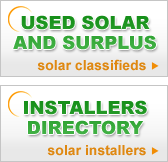
Nevada residential solar energy incentives
- Renewable energy systems property tax exemption
- 100% of any value of a qualified renewable energy system will
be subtracted from the appraised value of any residential home or
business for property tax purposes.
- Qualified equipment used in a home or business includes solar,
wind, geothermal, solid waste and hydroelectric systems.
- Property tax abatement for green buildings
- Multi-family residential buildings that earn certification under
the United States Green Building Council's Leadership in Energy
and Environmental Design (LEED) program may be eligible for a partial
abatement of property taxes.
- 25% - 35% property tax abatement will be awarded according to
the LEED certificate the property has.
- Buildings must earn either Silver, Gold or Platinum certification
under the LEED Green Building Rating System
- Abatement can last for no more than 10 years.
- NV Energy – Renewable generations rebate program
- Rebates are given for photovoltaic systems as well as small wind
and hydroelectric systems.
- Solar incentive amount for a residential property is $2.10 per
watt AC.
- There are no size restrictions for participating PV systems, but
rebates will be limited to 5 kW (AC) for residential systems.
- Solar systems must be in compliance with all applicable standards;
- Systems must carry a minimum 7-year warranty on inverters,
20-year warranty on panels, and 2-year warranty on labor.
- Modules and inverters must be on the California Energy Commission
(CEC) approved equipment list.
- Installations must comply with all federal, state, and local
codes and meet detailed siting criteria specified in program guidelines.
- Systems must be grid-connected, net-metered, and installed
by a Nevada-licensed electrical contractor.
- Net metering
- Net Metering allows customers to connect renewable energy systems
to the grid for their own use and to supply excess electricity to
the electric grid.
- Customer-generated electricity may be from solar, wind, small
hydropower, or fuel cell systems of up to one megawatt in size.
- Systems must be designed to offset part or all of a customer-generator's
electricity requirements.
- For all net-metered systems, customer net excess generation (NEG)
is carried over to the following month as a kilowatt-hour credit
without expiration.
- Residential renewable energy tax credit
- This federal personal tax credit allows the taxpayer to claim
a credit of 30% of expenditures including labor costs and installation
of qualified residential solar-electric systems, solar water heating
systems or fuel cells. Small wind-energy systems and geothermal
heat pumps can also be accredited for.
- Solar-electric systems and solar water heaters have a maximum
incentive of $2,000 if placed in service before 2009. There is no
maximum incentive for systems placed after 2008.
- The excess amount of the federal tax credit may be carried forward
to the next taxable year if it exceeds tax liability.
- This can be carried forward until 2016, but after that, it
is unknown if the unused credit will be able to be forwarded.
- Residential energy conservation subsidy exclusion
- This is a personal exemption of 100% of energy conservation subsidies
provided by public utilities.
- The value of a purchase or installation of any energy conservation
measure by a customer such as solar water heat, solar space heat
or photovoltaics will not be included in the customer’s gross
income.
- Customers of an electric utility company, who participate in
the utility’s energy conservation program, may receive a rate
reduction of electricity furnished or a nonrefundable credit against
the purchase price of the electricity on each monthly electric bill.
- Energy-Efficient Mortgages
- This is a federal loan program where homeowners can use EEM (energy-efficient
mortgages) to finance renewable energy technologies in a home.


|
|



